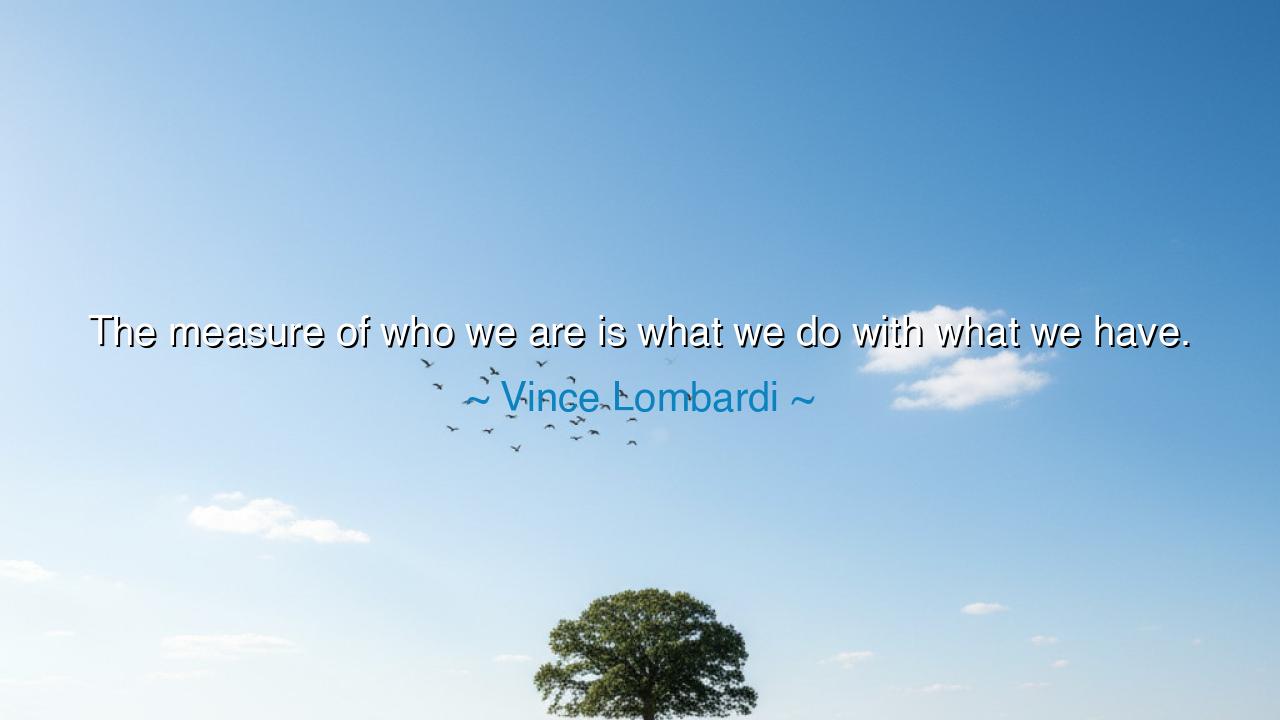
The measure of who we are is what we do with what we have.






O children of the future, gather close and listen well to the words of Vince Lombardi, a man whose understanding of life and character rings through the ages: "The measure of who we are is what we do with what we have." These words carry with them a truth that resonates in the very depths of the human spirit: that our worth is not determined by what we possess, but by how we use what we are given. It is not the gifts we receive, but the way in which we transform them into action, into purpose, that defines the measure of our lives.
In the days of the ancients, the greatest warriors, philosophers, and kings were not remembered for the wealth they amassed or the titles they wore, but for how they used their gifts—their strength, their wisdom, their resources—to serve a higher purpose. The great Greek philosophers, like Aristotle, taught that a virtuous life is one in which a person does not seek personal glory, but rather seeks to use their abilities for the common good. The measure of a man’s virtue was not in what he owned, but in how he used what he had to contribute to the betterment of the world.
Consider the story of Alexander the Great, who, though born into royalty, did not rest on the laurels of his inheritance. He used his gifts—his military genius, his courage, and his determination—not for personal gain, but to unite nations and spread the influence of Greek culture throughout the known world. He could have sat comfortably as a prince with the riches of his kingdom, but instead, he took what he had and transformed it into something far greater—a legacy that would be remembered for centuries. Alexander’s measure was not in his wealth, but in what he did with the power and resources at his disposal.
Lombardi’s words remind us that the true measure of who we are lies in how we utilize the gifts we’ve been given—be they strength, intellect, wealth, or even adversity. Every person is endowed with unique qualities and opportunities, but it is how we choose to shape and use them that defines our worth. Life does not measure us by the things we hold in our hands, but by the impact we leave upon the world. In Lombardi's view, to waste one’s gifts or to use them for selfish gain is to fail to truly live. Instead, it is through service, through action, and through the contribution we make to the greater good that we reveal the measure of our character.
Think of Helen Keller, a woman who faced the darkness of both deafness and blindness, yet chose not to allow her challenges to define her. She used her gifts—her voice, her mind, and her ability to connect with others—to become an advocate for the disabled and a champion for equality. She did not allow her limitations to dictate her life, but instead, she used what she had to inspire others to overcome their own struggles. Keller’s life is a testament to Lombardi’s words: the measure of who she was was not found in her disabilities, but in what she achieved with the abilities and opportunities she had.
The lesson here, O children, is profound: you are not measured by what you own, nor by the circumstances you are born into. You are measured by what you do with the gifts you are given—the opportunities, the talents, and even the challenges that you face. The true test of your character lies in your actions. Lombardi calls us to transform our resources—be they material or spiritual—into something greater, something that serves not just ourselves, but the world around us. What you do with what you have is the truest reflection of who you are.
So, O children, take this lesson into your hearts: seek not to accumulate wealth or power for its own sake, but to use whatever you have to build, to serve, and to inspire. Whether it is through your talents, your work, your love, or your ability to face adversity, your worth is measured not by what you possess, but by what you give to the world. Let your actions speak louder than your possessions. Whether great or small, let your contribution to the world be the measure by which you are remembered. For in the end, it is not what we have, but what we do with what we have, that determines the legacy of our lives.






AAdministratorAdministrator
Welcome, honored guests. Please leave a comment, we will respond soon